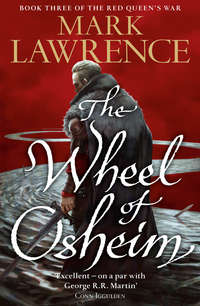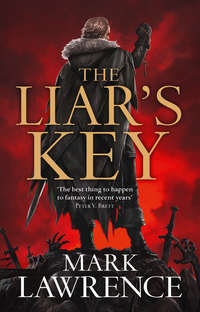
Полная версия
Red Sister
A cracking sound filled the immediate silence and it took Nona a moment to realize it was Denam’s knuckles as he formed fists. The giant’s scowl deepened. ‘I really hate you, Regol.’
‘Not a question. Anyone else?’
Silence.
Regol walked back into the darkness, stepping rafter to rafter with the unconscious grace of a cat.
Life in the Caltess proved to be a big improvement on an open cage rattling along the back-lanes of empire. Truth be told, it was an improvement on life in Nona’s village. Here she might be the smallest but she wasn’t the odd one out. The isolation of the village bred generations so similar in looks you might pick any handful at random to make a convincing family. Nona alone hadn’t fit the mould. A goat in the sheep herd. The family Partnis’s purse had furnished him with mixed every size and shape, every colour and shade, and in the attic’s gloom they were much of a muchness even so.
In addition to the four dozen children Partnis kept immediately beneath his roof, he housed a dozen apprentices, and seven fighters in their own set of rooms around the great hall. The apprentices shared a barracks house out in the rear of the compound.
Nona found a spot wedged between grain sacks larger than herself. Saida had more difficulty finding a space to squeeze into and was turned away by older residents time and again, even those she dwarfed. But in the end she settled on the boards close to Nona’s sack-pile, further back where the roof sloped so low that she had to roll into place.
That first night the hall opened its doors and the world flowed in to see men bleed. Denam and Regol got to watch from the highest rungs of the ladder in the furthest corner of the great hall, behind counters where the apprentices sold ale and wine to the crowd. The eldest of the remaining children crowded around the trapdoor. Everyone else had to find some chink among the rafters through which the events below might be glimpsed.
Nona’s spot afforded her a narrow view of the second ring. She wondered that they called it a ring when in fact the ropes strung between the four posts enclosed a square perhaps eight yards on a side, the whole thing a raised platform so that the fighter’s feet were level with the average man’s brow. She could see the tops of many heads, hundreds packed tight. The hubbub of their voices filled the attic. As the crowd built so did the noise, each of them having to shout just to be heard by their neighbour.
Saida lay close by, her eye to a crack. At her side an older boy, Marten, peered through a knot hole to which he laid ownership.
‘It’s all-comers tonight,’ Marten said, without looking up. ‘Ranking bouts on the seven-day, all comers on the second, exhibitions on the fourth. Blade matches are the last day of the month.’
‘My da said men fight in pits in the city …’ Saida said timidly, waiting to be told she was wrong.
‘In the Marn ports some do,’ Marten said. ‘Partnis says it’s a foolishness. If you’ve got willing fighters and a paying crowd you put them up on a platform, not down in a hole, where only the first row can see them.’
Nona lay, watching the throng below her while fights progressed unseen at the hall’s far end. Her view offered only the tops of heads, but she judged reactions by the pulse and flow of the crowd. Their roaring sounded at times like the howl of a single great beast, so loud it resonated in her chest, throbbing in her own voice when she yelled her challenge back at them.
At last a figure climbed into the ring beneath them. All around her Nona could feel other children scrambling for a view. Someone tried to lift her from her spot but she caught the hands that grabbed her and dug her nails in. The unknown someone dropped her with a howl and she put her eye back to the crack.
‘Raymel!’ The voices around her echoed the cries of the mob.
In the ring he looked a heavily-built man with thick blond hair, naked save for the white cloth bound around his groin, his skin gleaming with oil, the muscles of his stomach in sharp relief, showing each band divided from the next. Nona had glimpsed him wandering the hall earlier in the day and knew that he was enormous, taller even than Maya, and moving with none of her awkward blunder. Raymel prowled, a killer’s confidence in each motion. The man was a gerant prime. In the attic’s dimness Nona had learned the code that Partnis and Giljohn had used when selling her. The range ran from touch through half-blood and prime to full-blood. A touch could be thought of as quarter-blood and a prime as three-quarters. For gerants, primes often made the best fighters, full-bloods though rarer still and larger were too slow – though perhaps they just said that at the Caltess as they had none to show.
‘You’ll see something now!’ A girl’s voice, excited, at Nona’s left.
Marten had explained that any hopeful wishing to win a fight purse, or even to join the Caltess, could present themselves on all-comers’ night and for a crown they might pit themselves against Partnis’s stable.
‘Raymel will kill them,’ Saida said, awestruck.
‘He won’t.’ Even shouting above the roar Marten managed to sound scornful. ‘He’s paid to win. He’ll put on a show. Killing’s not good for business.’
‘Except when it is.’ Another voice close at hand.
‘Raymel does what he wants.’ The girl to Nona’s left. ‘He might kill someone.’ She sounded almost hungry for it.
A challenger entered the ring: a bald man, fat and powerful, the hair on his back so thick and black as to hide his skin. He had arms like slabs of meat – perhaps a smith given to swinging a hammer every day. Nona couldn’t see his face.
‘Doesn’t Partnis tell Raymel—’
‘No one tells Raymel.’ The girl cut Saida off. ‘He’s the only highborn to step into a ring in fifty years. Regol said so. You don’t tell the highborn what to do. The money’s nothing to him.’
Nona had heard the same tone of worship in the Hope church where her mother and Mari Streams called on the new god and sang the hymns Preacher Mickel taught them.
The bell sounded and Raymel closed with the blacksmith.
Nona saw a slice of the ring, from one fighter’s corner to the other’s. When they stepped to the side she lost them. Raymel moved with an unhurried precision, stopping the blacksmith’s advance with punches to the head, moving back to let him recover, luring him forward into the next. It didn’t seem a contest, unless you considered the blacksmith to be competing to see how many times he could stop the giant’s fist with his face.
The baying of the crowd rose with each impact, with each spray of blood and spittle. By the time Raymel stopped punching the smith long enough for the man to fall over, his opponent had yet to land a blow.
‘Why would anyone do that?’ Saida asked, lifting from her peephole, shuddering. ‘Why would they fight him?’
‘Lot of money in that fight purse,’ Marten said. ‘It gets fatter every time someone tries and fails.’
Nona kept watching as Raymel strode back and forth across the ring. She said nothing but she knew there was more to it than money. Every hard line the fighter owned was a challenge, written across him. The masses’ roar fanned the fire, but it was Raymel that lit it. Come and try me.
Two more tried before the night was over, but the fighter in the other ring, Gretcha, had more takers. Perhaps she was more of a performer, letting her opponents take a shot, putting them down with more style and less brutality. Raymel treated his foes with disdain, dropping them to the boards bloody and humiliated.
The work Maya set was neither long, nor arduous, being split between more children than was necessary. In the great hall Nona polished, swept and scrubbed. In the kitchens she peeled, carried, washed, sliced and stoked. In the privies she slopped, bailed, wiped and retched. Maintenance of the fight equipment, the sparring rings, the training weapons and the like all fell to the apprentices. The fighters cared for their own weapons, as would anyone who trusted their life to a sharp edge or sturdy mail.
Sometimes groups of the older children were hired outside the Caltess to pick fruit, and dig ditches, but mostly, as Regol had said, their main task was to grow and to show the promise for which they had been purchased. Maya confided that none of them would be sold on for at least a year, probably two or three.
‘Sometimes the promise won’t show properly until a girl bleeds. I wasn’t half my height at thirteen. Ain’t no point Partnis putting you in training until he knows what you’ll be. Training costs. And it’s wasted on most. Nobody ain’t never going to make ring-fighter without the old blood showing in them. And even when he’s sure you’ve got the gift for it Partnis likes to wait – says best training’s done when you’re mostly grown into your size and speed, so you don’t have to be adjusting all the time.’
Twice a day Maya had the whole attic out in the yard for an hour, first clearing the fighters’ weights back into their chests in the storeroom, then running endless laps, regardless of rain or wind. Nona looked forward to these daily escapes from the closed-in boredom of the attic and the routine of indoor chores. She worked with Saida and Tooram, who had been the last of Giljohn’s acquisitions, to lift the smaller dumbbells abandoned in the yard and return them to the equipment room. In truth, she and Tooram were probably more hindrance than help to Saida. Denam would pass them as they struggled up the steps, one of the heavier dumbbells in each hand, just the sweat plastering the red flame of his hair to his forehead to let them know the effort he was hiding.
They stopped to let him pass, then Saida led them on. ‘Heave!’
Nona didn’t mind that she wasn’t helping much, or that her arms ached, her back hurt and her eyes stung with sweat. She liked to feel part of something. Saida was her friend and whilst she might not need Nona’s help with the weights, she appreciated it.
In their friendship Nona found something absent in the faith of the village, or her mother’s Hope, absent in Nana Even’s moral instruction, or in the bonds of family she had seen break. Something she considered holy and worthy of sacrifice. Making friends came hard to Nona – she didn’t see how it worked, only that sometimes it happened. She had had just one friend, only briefly, and lost him, she wouldn’t lose another.
‘Tell me how you ended up at Harriton, child. Looking up at a noose.’ Abbess Glass’s voice punctured Nona’s remembering and she discovered herself walking along a stony road that divided broad, windswept fields given over to horses and sheep. Left and right the occasional farmstead dotted the terrain, the low-gabled roofs of a villa lay ahead, and beyond that the steep escarpment below the plateau.
‘What?’ Nona shook her head. She had almost no recollection of leaving the city. Glancing back, she saw it lay a mile or more behind her, and that two nuns now flanked the abbess.
‘You were going to tell me what happened with Raymel Tacsis,’ the abbess said.
Nona looked again at the nuns, both taller than Abbess Glass, one very lean, the other with more curves to her, their habits fluttering about them. She half-remembered them joining the abbess at some small gate through the city wall. One had perhaps as many years as the abbess, her face pinched and weathered, eyes cold, lips thin. The other was younger, green-eyed, returning Nona’s distracted inspection with a full smile that made her look away.
Nona fixed her eyes on the horizon. The convent was no longer visible, set back from the edge of the escarpment. ‘Saida was told to clean the floors in Raymel’s rooms. I heard her screaming.’ It hadn’t sounded like a person. In the village when Grey Jarry slaughtered pigs … it sounded like that. Not until one of the boys crowded around the trapdoor had said ‘Raymel’s rooms’ had some cold hand taken hold inside Nona’s chest and drawn her forward.
‘I came down the ladder. Fast.’ It had been slower than falling, but not much slower. She had run into the foyer. Saida had left a bucket and mop to hold the door open, a great slab of oak with scrolling brass hinges.
‘There were pieces of pottery all over the floor. And he was hurting her.’ Saida had knocked something from its niche – she was always clumsy. Raymel had her arm in his fist, his hand swallowing it from wrist to elbow, and he’d lifted her from the ground. He just stood there turning his hand from one side to the other while Saida struggled and wriggled, trying to reduce the awful strain on elbow and shoulder, shrieking all the while.
‘I told him to put her down but he didn’t hear me.’ Nona had run to try to support her friend’s weight, but Saida weighed twice what she did. Raymel noticed her then and, laughing, shook Saida so that Nona flew free. Something cracked in Saida’s arm when he did it – loud enough to register over her screams.
‘So I stopped him. I cut his throat.’
The younger nun snorted behind her. ‘They say he’s nine foot tall.’
‘I climbed.’ Raymel wasn’t nine foot but he was over eight. He had gone down on one knee, still holding Saida off the ground by her broken arm, taunting Nona with an ugly grin on his handsome face.
Nona had sprinted forward. There was time for the surprise to register in Raymel’s eyes, but not for him to move. She had leapt onto his knee to gain the necessary height then slashed her hand across his throat.
‘How did you cut him?’ The older nun, from behind.
‘I …’ Nona pictured Raymel, golden hair curling across an unfurrowed brow, the smile opening into something else, blood sheeting crimson from the slices she’d set deep in the meat of his neck. ‘I pulled the dagger from his hip as I climbed.’
‘That,’ said the younger nun, ‘sounds unlikely.’
Abbess Glass replied before Nona could deliver her sharp reply. ‘Nevertheless, if you look more closely, Sister Apple, you will see that the girl’s tunic was once white rather than brown – a brown which, if the guards at Harriton are to be believed, is a combination of drying blood and prison grime. Moreover she and her friend were both to be hanged for the murder of Raymel Tacsis.’
‘Then why isn’t he dead?’ Nona asked. She wanted Raymel to be dead.
‘Because his father is very rich, Nona.’ The abbess led them from the road onto a narrower track aimed towards the towering walls of the escarpment. ‘Not just a little bit rich but rich enough to buy a different mansion to sleep in every night from now until age claims him.’
‘Money doesn’t matter when you’re bleeding.’ Nona frowned. Rich or poor, people looked the same on the inside.
‘Thuran Tacsis is rich enough that he owns Academy men.’ The abbess hitched up her habit to help her climb the slope. ‘I miss my crozier already. An old lady without her stick to lean on is a sad thing indeed.’
Nona said nothing, not understanding the abbess’s words.
‘Academy men … Wizards, Nona! Mages. Sorcerers. Witches and warlocks. Children with marjal blood. Educated and raised at the emperor’s expense and bound to the Ark and to his service, but free to earn a living outside the palace until such time as he requires their skills.’
‘They can raise a man from the dead?’ Suddenly she thought of her father, unable to remember anything of him but thick black hair and strong, safe arms.
‘No, but they can stop a live one becoming dead. There’s a boundary, a place where we cross over to join the Ancestor. Some among us can visit that boundary and hold a person there while their body heals from wounds that would otherwise make an end of them.’
‘So rich people never die?’ Nona wondered at it, buying off death with gold coins.
The abbess shook her head. ‘No warlock stays by the boundary for long.’ Her breath came shorter now as the way grew steeper. ‘Thuran has a dozen warlocks working in shifts to hold his son from crossing. And many of the things that kill us the body can’t repair, no matter how much time it is given. Cut flesh though, and lost blood … a healthy body can mend one and replace the other. The real risk is when they bring a person back to their body – there are … beings … that will try to follow in their wake and find a home in their minds. The longer the person is kept on the boundary, the harder it is to keep out such passengers.’
Nona thought of Raymel Tacsis lying in his father’s halls surrounded by Academy men sweating to keep him from death. Saida was dead – Nona had seen her feet poking beneath the sheet in the prison yard, their wrappings still stained with Raymel’s blood. She had no pity for him.
‘I hope he comes back full of devils and they eat his heart.’
4
‘You could send the child on her way here, abbess.’
They stood at the point where the track began its steep ascent up the tumbled cliffs of the plateau, cutting back and forth across the gradient in a dozen hairpin turns. The older nun turned to Nona and pointed across the woods and fields to the west. ‘Morltown is five miles that way. A girl could make herself useful there, find fieldwork.’
Sister Apple stood shoulder to shoulder with Sister Tallow. ‘The high priest will be on this in a heartbeat. The Tacsis won’t even have to ask.’
‘Pick your fights and pick your ground, abbess,’ Sister Tallow said. ‘Jacob would love to get his feet back under the convent table. This would be the perfect excuse.’
‘And you did just steal her from prison …’ Apple frowned, glancing back towards the distant city.
‘Mistress Blade tells me not to fight.’ A smile, then the abbess turned to begin the climb. ‘And Apple tells me not to steal …’ Nona started to follow her. ‘You’re nuns. Show a little faith.’
A last edge of the sun clung to the horizon as Abbess Glass led the way towards a peculiar forest of stone pillars, their shadows reaching across hundreds of yards of rock towards the travellers’ approach. Nona followed, flanked by the two nuns, neither of them winded by the long climb that had set the abbess wheezing. The old one, Sister Tallow, looked as if she could climb all day. The younger, Sister Apple, at least had the decency to appear flushed. Nona, toughened by endless laps at the Caltess, felt the climb in her legs, and the dampness of her shift where sweat stuck it to her back, but made no complaint.
The plateau, really one huge slab of rock, narrowed to a neck of land before widening into a promontory. The pillars stood across the neck, from cliff to cliff, dozens deep, scores across. Abbess Glass led the way through – finding her path seemingly at random. All about them the columns, taller than trees, stretched towards the darkening sky. The place held an odd silence, the wind finding nothing to sing its tune, only stirring the dust and grit among the towers of carved stone. Nona liked it.
The pillars bounded Sweet Mercy Convent one side, and on the other the edges of two cliffs marched towards a sharp convergence. The main dome rose black against the crimson sky, a dozen and more outbuildings visible to either side. Nona followed the nuns towards its arched entrance, the weight of the day on her shoulders now, fatigue wrapping her in its dull grip, making both her anger and her sorrow grow more distant, shaping them into things that might be set apart for a night of dreams.
‘You live in there?’ As they drew closer Nona began to realize how large the dome was. The whole of the Caltess would fit inside several times over, stacked on top of itself.
‘That’s the Dome of the Ancestor, Nona. The Ancestor lives there, nobody else.’
‘Is he terribly big?’ Nona asked. Behind her Sister Apple stifled a laugh.
‘The Ancestor occupies any space built in their honour. In Verity the Ancestor is present in ten thousand household shrines, some into which even you would find it hard to squeeze, others larger than most houses. Here on the plateau the church was able to give the Ancestor a grander home – a gift of Emperor Persus, third of his name.’
Nona followed on in silence, her lips buttoned against the thought that the Ancestor seemed very greedy to be taking up so much room while the children at the Caltess wedged themselves into any nook or cranny that would take them.
‘This is my house.’ Abbess Glass waved a hand at a blocky stone building looming out of the deepening shade. ‘At least for as long as I am abbess here. It’s also Malkin’s home.’ A large grey cat lay coiled on the steps. The abbess turned to face Nona and the two sisters. ‘Sister Apple will find you somewhere to sleep and in the morning you’ll be introduced to your class, after which—’
‘Class?’ Nona blinked. In the village Nana Even had held class every seven-day, teaching the older children their numbers and such. Nona had tried to listen in but bigs chased her away as if their stupid numbers were a secret too important for her ears.
‘You’re here to join the convent, Nona.’ Shadow hid the abbess’s face but perhaps there was a smile there. ‘If you want to. And that means living here and learning all the things a sister needs to learn. There are classes every day except seven-day.’ She turned and walked away.
‘Come, Nona.’ Sister Apple held out her hand. Nona regarded it, uncertain whether the woman wanted something from her. After a moment Apple returned her hand to her side and continued on around the curve of the dome. Sister Tallow followed, her habit flapping about her legs.
Darkness had swallowed the plateau behind them and the wind roamed there. Nona stared back along the path the nuns had brought her by, the pillars invisible now. The heat of the climb had left her and the Corridor wind ran sharp fingers through her Caltess shift, filching any remaining warmth. It carried a salt edge – perhaps the sea, though it lay so many miles away. Nona shivered, hugged herself, and followed the nuns.
At the rear of the dome a long, low building extended like a tail on a huddled dormouse. Sister Apple stopped at a sturdy door beneath the peak of a tiled roof. A lantern swung on a hook, sparing enough light for the nun to match the iron key she drew from her habit to the keyhole in the door’s locking plate.
Sister Apple lifted the lantern down from its hook, adjusting its cowl. ‘These are the nun’s cells.’ She kept her voice low.
‘Cells!’ Nona took a step back.
‘Not like prison cells.’ Sister Apple smiled, then frowned. ‘Well, quite similar truth be told, but they’re clean and there are no locks on the doors.’ She stepped through the doorway. ‘You’ll sleep here tonight. If you study hard and do well you might get to come back for another night in about ten years.’
The door gave onto a long corridor. The beam of Sister Apple’s lantern revealed the passage extended all the way to a black door where it reached the dome. Left and right, repeating every few yards, a pair of round-topped doors guarded nun’s cells. Sister Apple walked in, stepping softly. Sister Tallow turned without a word as they passed the third pair and passed into the darkness of the cell to the left. The black door at the end drew Nona’s eyes. Something about it.
Eighteen doors in, about half the length of the corridor, Sister Apple stopped and pushed open the door to the right. She leaned in and took a candle from the box on the wall, lighting it from the lantern. ‘You’ll be in here. There’s linen and a blanket on the pallet. I’ll collect you in the morning.’ She handed the candle to Nona. ‘Don’t start any fires.’
Nona watched Sister Apple walk back towards the main door, the light diminishing with her departure. Finally the nun entered one of the cells close to Sister Tallow’s, leaving Nona in her own small and flickering pool of light. The silence that had rolled back with the shadows now returned, deeper and thicker than any Nona had known. She stood, held by its completeness. No sound. Not the wind’s moan. Not the creak of timbers or rustle of leaves. Not the skittering of rats or the distant complaint of owls. Nothing.
The door at the end of the corridor reclaimed her attention, although the darkness had hidden it. The memory of that door, black and polished, pressed like a finger between her eyes. Her feet wanted to take her there, her hands to set themselves flat against the smooth wood and to feel up close the vast and slumbering … fullness … that lay beyond.








